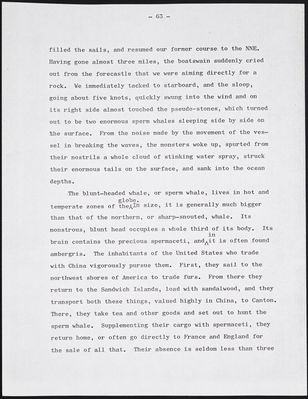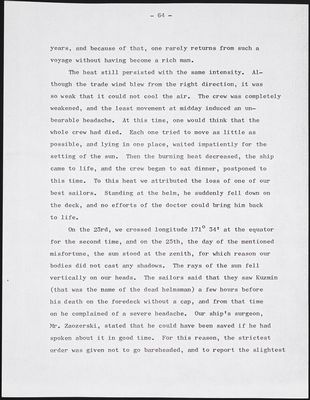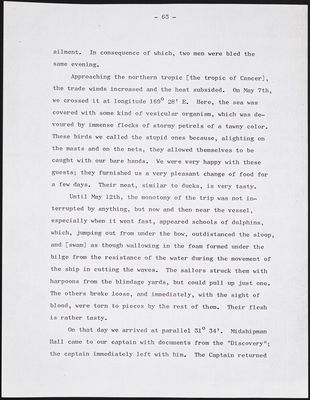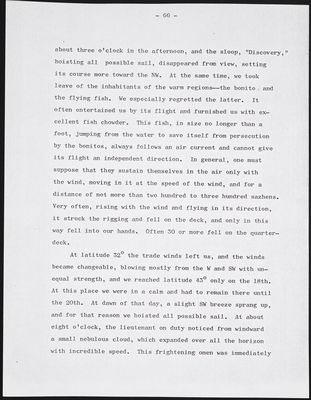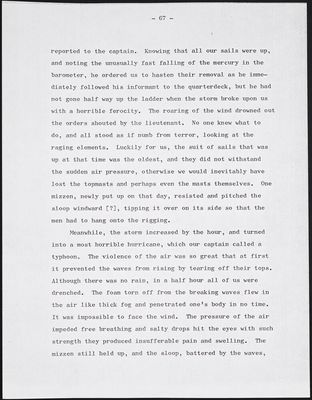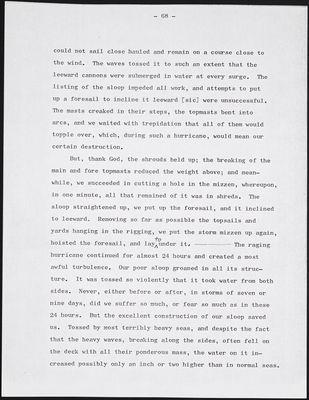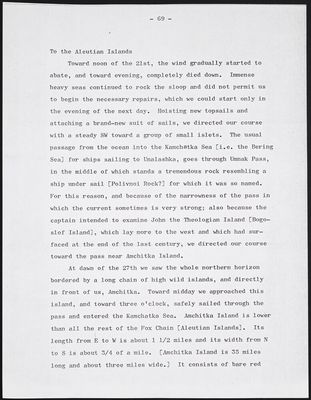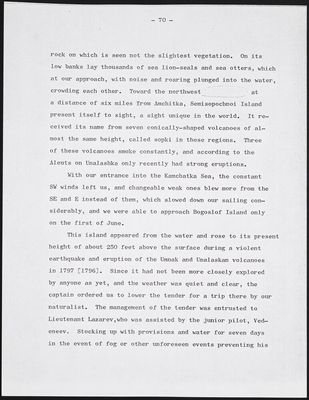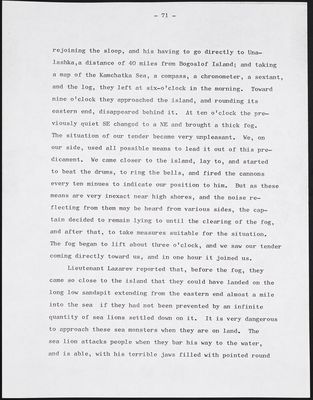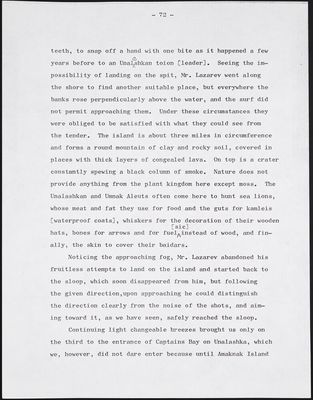Pages That Need Review
Journey of the sloop Good Intent to explore the Asiatic and American shores of Bering Strait, 1819 to 1822. Part one
mss142-vasilevShishmarev-i3-013
--63--
filled the sails, and resumed our former course to the NNE. Having gone almost three miles, the boatswain suddenly cried out from the forecastle that we were aiming directly for a rock. We immediately tacked to starboard, and the sloop, going about five knots, quickly swung into the wind and on its right side almost touched the pseudo-stones, which turned out to be two enormous sperm whales sleeping side by side on the surface. From the noise made by the movement of the vessel in breaking the waves, the monsters woke up, spurted from their nostrils a whole cloud of stinking water spray, struck their enormous tails on the surface, and sank into the ocean depths.
The blunt-headed whale, or sperm whale, lives in hot and temperate zones of the globe. In size, it is generally much bigger than that of the northern, or sharp-snouted, whale. Its monstrous, blunt head occupies a whole third of its body. Its brain contains the precious spermaceti, and in it is often found ambergris. The inhabitants of the United States who trade with China vigorously pursue them. First, they sail to the northwest shores of America to trade furs. From there they return to the Sandwich Islands, load with sandalwood, and they transport both these things, valued highly in China, to Canton. There, they take tea and other goods and set out to hunt the sperm whale. Supplementing their cargo with spermaceti, they return home, or often go directly to France and England for the sale of all that. Their absence is seldom less than three
mss142-vasilevShishmarev-i3-014
--64--
years, and because of that, one rarely returns from such a voyage without having become a rich man.
The heat still persisted with the same intensity. Although the trade wind blew from the right direction, it was so weak that it could not cool the air. The crew was completely weakened, and the least movement at midday induced an unbearable headache. At this time, one would think that the whole crew had died. Each one tried to move as little as possible, and lying in one place, waited impatiently for the setting of the sun. Then the burning heat decreased, the ship came to life, and the crew began to eat dinner, postponed to this time. To this heat we attributed the loss of one of our best sailors. Standing at the helm, he suddenly fell down on the deck, and no efforts of the doctor could bring him back to life.
On the 23rd, we crossed longitude 171[degree symbol] 34' at the equator for the second time, and on the 25th, the day of the mentioned misfortune, the sun stood at the zenith, for which reason our bodies did not cast any shadows. The rays of the sun fell vertically on our heads. The sailors said that they saw Kuzmin (that was the name of the dead helmsman) a few hours before his death on the foredeck without a cap, and from that time on he complained of a severe headache. Our ship's surgeon, Mr. Zaozerski, stated that he could have been saved if he had spoken about it in good time. For this reason, the strictest order was given not to go bareheaded, and to report the slightest
mss142-vasilevShishmarev-i3-015
--65--
ailment. In consequence of which, two men were bled the same evening.
Approaching the northern tropic [the tropic of Cancer], the trade winds increased and the heat subsided. On May 7th, we crossed it at longitude 169[degree symbol] 28' E. Here, the sea was covered with some kind of vesicular organism, which was devoured by immense flocks of storm petrels of a tawny color. These birds we called the stupid ones because, alighting on the masts and on the nets, they allowed themselves to be caught with our bare hands. We were very happy with these guests; they furnished us a very pleasant change of food for a few days. Their meat, similar to ducks, is very tasty.
Until May 12th, the monotony of the trip was not interrupted by anything, but now and then near the vessel, especially when it went fast, appeared schools of dolphins, which, jumping out from under the bow, outdistanced the sloop, and [swam] as though wallowing in the foam formed under the bilge from the resistance of the water during the movement of the ship in cutting the waves. The sailors struck them with harpoons from the blindage yards, but could pull up just one. The others broke loose, and immediately, with the sight of blood, were torn to pieces by the rest of them. Their flesh is rather tasty.
On that day we arrived at parallel 31[degree symbol] 34'. Midshipman Hall came to our captain with documents from the "Discovery"; the captain immediately left with him. The Captain returned
mss142-vasilevShishmarev-i3-016
--66--
about three o'clock in the afternoon, and the sloop, "Discovery," hoisting all possible sail, disappeared from view, setting its course more toward the NW. At the same time, we took leave of the inhabitants of the warm regions--the bonito and the flying fish. We especially regretted the latter. It often entertained us by its flight and furnished us with excellent fish chowder. This fish, in size no longer than a foot, jumping from the water to save itself from persecution by the bonitos, always follows an air current and cannot give its flight an independent direction. In general, one must suppose that they sustain themselves in the air only with the wind, moving in it at the speed of the wind, and for a distance of not more than two hundred to three hundred sazhens. Very often, rising with the wind and flying in its direction, it struck the rigging and fell on the deck, and only in this way fell into our hands. Often 30 or more fell on the quarterdeck.
At latitude 32[degree symbol] the trade winds left us, and the winds became changeable, blowing mostly from the W and SW with unequal strength, and we reached latitude 43[degree symbol] only on the 18th. At this place we were in a calm and had to remain there until the 20th. At dawn of that day, a slight SW breeze sprang up, and for that reason we hoisted all possible sail. At about eight o'clock, the lieutenant on duty noticed from windward a small nebulous cloud, which expanded over all the horizon with indcredible speed. This frightening omen was immediately
mss142-vasilevShishmarev-i3-017
--67--
reported to the captain. Knowing that all our sails were up, and noting the unusually fast falling of the mercury in the barometer, he ordered us to hasten their removal as he immediately followed his informant to the quarterdack, but he had not gone half way up the ladder when the storm broke upon us with a horrible ferocity. The roaring of the wind drowned out the orders shouted by the lieutenant. No one knew what to do, and all stood as if numb from terror, looking at the raging elements. Luckily for us, the suit of sails that was up at that time was the oldest, and they did not withstand the sudden air pressure, otherwise we would inevitably have lost the topmasts and perhaps even the masts themselves. One mizzen, newly put up that day, resisted and pitched the sloop windward [?], tipping it over on its side so that the men had to hang onto the rigging.
Meanwhile, the storm increased by the hour, and turned into a most horrible hurricane, which our captain called a typhoon. The violence of the air was so great that at first it prevented the waves from rising by tearing off their tops.
Although there was no rain, in a half hour all of us were drenched. The foam torn off from the breaking waves flew in the air like thick fog and penetrated one's body in no time. It was impossible to face the wind. The pressure of the air impeded free breathing and salty drops hit the eyes with such strength they produced insufferable pain and swelling. The mizzen still held up, and the sloop, battered by the waves,
mss142-vasilevShishmarev-i3-018
-- 68 --
could not sail close hauled and remain on a course close to the wind. The waves tossed it to such an extent that the leeward cannons were submurged in water at every surge. The listing of the sloop impeded all work, and attempts to put up a foresail to incline it leeward [sic] were unsuccesful. The masts creaked in their steps, the topmasts bent into arcs, and we waited with trepidation that all of them would topple over, which, during such a hurricane, would mean out certain destruction.
But, thank God, the shrouds help up; the breaking of the main and fore topmasts reduced the weight above; and meanwhile, we succeded in cutting a hole in the mizzen, whereupon, in one minute, all that remained of it was in shreds. The sloop straightened up, we put up the foresail, and it inclined to leeward. Removing so far as possible the topsails and yards hanging in the rigging, we put the storm mizzen up again, hoisted the foresail, and lay to under it. The raging hurricane continued for almost 24 hours and created a most awful turbulence. Our poor sloop groaned in all its structure. It was tossed so violently that it took water from both sides. Never, either before or after, in storms of seven or nine days, did we suffer so much, or fear so much as in these 24 hours. But the excellent construction of our sloop saved us. Tossed by most terribly heavy seas, and despite the fact that the heavy waves, breaking along the sides, often fell on the deck with all their ponderous mass, the water on it increased possibly only an inch or two higher than in normal seas.
mss142-vasilevShishmarev-i3-019
- 69 -
To the Aleutian Islands
Toward noon of the 21st, the wind gradually started to abate, and toward evening, completely died down. Immense heavy seas continued to rock the sloop and did not permit us to begin the necessary repairs, which we could start only in the evening of the next day. Hoisting new topsails and attaching a brand-new suit of sails, we direced our course with a steady SW toward a group of small islets. The usual passage from the ocean into the Kamchatka Sea [i.e. the Bering Sea] for ships sailing to Inalashka, goes through Umnak Pass, in the middle of which stands a tremendous rock resembling a ship under sail [Polivnoi Rock?] for which it is was so named. For this reason, and because of the narrowness of the pass in which the current sometimes is very strong; also because the captain intended to examine John the Theologian Island [Bogoslof Island], which lay more to the west and which had surfaced at the end of the last century, we directed our course toward the pass near Amchitka Island.
At dawn of the 27th we saw the whole northern horizon bordered by a long chain of high wild islands, and directly in front of us Amchitka. Toward middwy we approached this island, and toward three o'clock, safely sailed through the pass and entered the Kamchatka Sea. Amchitka Island is lower than all the res of the Fox Chain [Aleutian Islands]. Its length from E to W is about 1 1/2 miles and its width from N to S is about 3/4 of a mile. [Amchitka Island is 35 miles long and about three miles wide.] It consists of bare red
mss142-vasilevShishmarev-i3-020
-- 70 --
rock on which is seen not the slightest vegetation. On its low banks lay thousands of sea lion-seals and sea otters, which at our approach, with noise and roaring plunged into the water, crowding each other. Toward the northwest at a distance of six miles from Amchitka, Semisopochnoi Island present itself to sight, a sight unique in the world. It received its name from seven conically-shaped volcanoes of almost the same height, called sopki in these regions. Three of these volcanoes smoke constantly, and according to the Aleuts on Unalashka only recently had strong eruptions.
With our entrance into the Kamchatka Sea, the constant SW winds left us, and changeable weak ones blew more from the SE and E instead of them, which slowed down our sailing considerably, and we were able to approach Bogoslof Island only on the first of June.
This island appeared from the water and rose to its present height of about 250 feet above the surface during a violent earthquake and eruption of the Umnak and Unalaskan volcanoes in 1797 [1796]. Since it had not been more closely explored by anyone as yet, and the weather was quiet and clear, the captain ordered us to lower the tender for a trip there by our naturalist. The management of the tender was entrusted to Lieutenant Lazarev,who was assisted by the junior pilot, Vedeneev. Stocking up with provisions and water for seven days in the event of fog or other unforeseen events preventing his
mss142-vasilevShishmarev-i3-021
-- 71 --
rejoining the sloop, and his having to go directly to Unalashka,a distance of 40 miles from Bogoslof Island; and taking a map of the Kamchatka Sea, a compass, a chronometer, a sextant, and the log, they left at six-o'clock in the morning. Toward nine o'clock they approached the island, and rounding its eastern end, disasppeared behind it. At ten o'clock the previously quiet SE changed to a NE and brought a thick fog. The situation of our tender became very unpleasant. We, on our side, used all possible means to lead it out of this predicament. We came closer to the island, lay to, and started to beat the drums, to ring the bells, and fired the cannons every ten minues to indicate our position to him. But as these means are very inexact near high shores, and the noise reflecting from them may be heard from various sides, the captain decided to remain lying to until the clearing of the fog, and after that, to take measures suitable for the situation. The fog began to lift about three o'clock, and we saw our tender coming directly toward us, and in one hour it joined us.
Lieutenant Lazarev reported that, before the fog, they came so close to the island that they could have landed on the long low sandspit extending from the eastern end almost a mile into the sea if they had not been prevented by an infinite quantity of sea lions settled down on it. It is very dangerous to approach these sea monsters when they are on land. The sea lion attacks people when they bar his way to the water, and is able, with his terrible jaws filled with pointed round
mss142-vasilevShishmarev-i3-022
-- 72 --
teeth, to snap off a hand with one bite as it happened a few years before to an Unalashkan toion [leader]. Seeing the impossibility of landing on the spit, Mr. Lazarev went along the shore to find another suitable place, but everywhere the banks rose perpendicularly above the water, and the surf did not permit approaching them. Under these circumstances they were obliged to be satisfied with what they could see from the tender. The island is about three miles in circumference and forms a round mountain of clay and rocky soil, covered in places with thick layers of congealed lava. On top is a crater constantly spewing a black column of smoke. Nature does not provide anything from the plant kingdom here except moss. The Unalashkan and Umnak Aleuts often come here to hunt sea lions, whose meat and fat they use for food and the guts for kamleis [waterproof coats], whiskers for the decoration of their wooden hats, bones for arrows and for fuel [sic] instead of wood, and finally, the skin to cover their baidars.
Noticing the approaching fog, Mr. Lazarev abandoned his fruitless attempts to land on the island and started back to the sloop, which soon disappeared from him, but following the given direction,upon approaching he could distinguish the direction clearly from the noise of the shots, and aiming toward it, as we have seen, safely reached the sloop.
Continuing light changeable breezes brought us only on the third to the entrance of Captains Bay on Unalashka, which we, however, did not dare enter because until Amaknak Island
